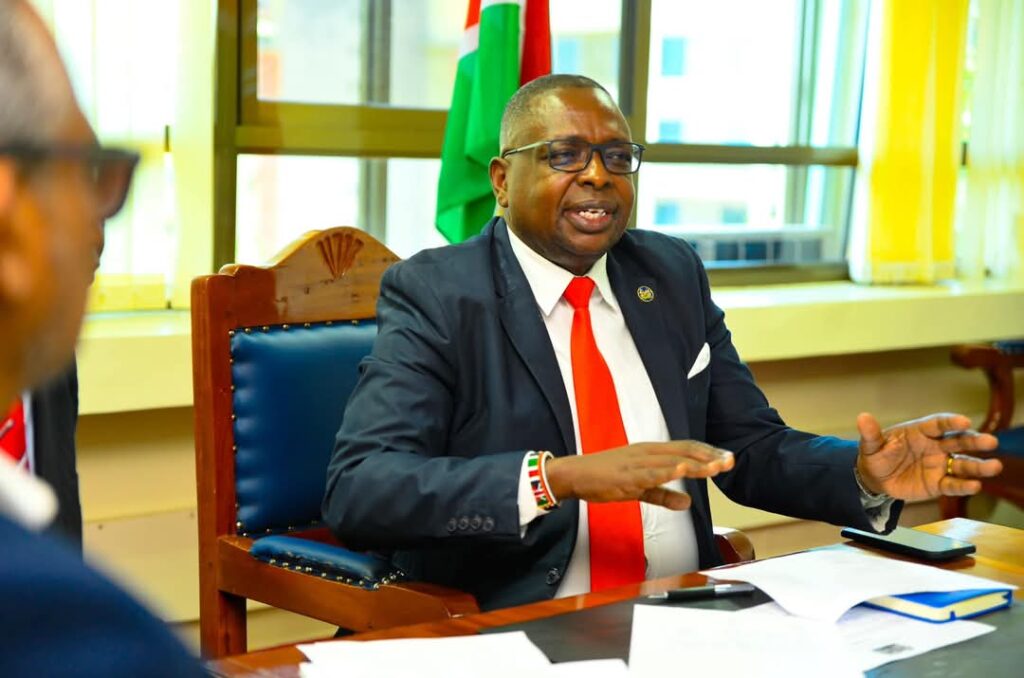
by Steve El Sabai
As he transitions from the corridors of domestic public administration to the international diplomatic stage, outgoing Principal Secretary Geoffrey Kaituko offers a compelling narrative of reform, institutional fortification, and visionary leadership. His departure marks the culmination of a tenure distinguished by resolute governance and strategic policy interventions that have left a lasting imprint on Kenya’s labour and maritime sectors.
Reflecting on his appointment to the Ministry of Labour in November 2022, Kaituko recounts inheriting a volatile migration landscape, particularly with regard to Kenyan migrant workers in the Gulf region. “At the time, the distress signals emanating from Saudi Arabia were deafening — dominating headlines and exposing the vulnerabilities in our bilateral labour frameworks,” he stated.
In response, Kaituko orchestrated a comprehensive suite of reforms that not only stemmed the tide of abuse but also introduced systemic accountability. “Through meticulous policy engineering and diplomatic engagement, we restored order to an otherwise chaotic domain.” Central to these efforts was the conceptualization and subsequent Cabinet approval of Kenya’s Global Labour Migration Strategy in August 2023 — a forward-looking blueprint that now undergirds the nation’s international labour mobility agenda.
Upon his redeployment to the State Department for Shipping and Maritime Affairs, Kaituko applied the same reformist zeal to an equally complex sector. “One of our paramount achievements was the entrenchment of robust regulatory frameworks through Parliamentary sanction,” he noted. “A sector governed by a debilitated regulator is predisposed to dysfunction; we reversed that trajectory by fortifying the Kenya Maritime Authority.”
These reforms were complemented by a surge in seafaring opportunities for Kenyans, with over 5,000 maritime professionals deployed to foreign vessels. “This outcome is a direct dividend of deepened bilateral ties and proactive engagement with international maritime employers, particularly within the hospitality cluster,” Kaituko explained.
The revitalization of the Bandari Maritime Academy stands as a testament to Kaituko’s commitment to capacity building. Tuition fees were halved — and in some cases, slashed by nearly 80% — broadening access to maritime training and enhancing Kenya’s competitiveness in the global seafaring market.
Meanwhile, national maritime security received an unprecedented boost through the operationalization of the National Maritime Security Committee — a multi-agency entity tasked with safeguarding Kenya’s territorial waters. “We confronted maritime criminality head-on, from wildlife trafficking and illicit smuggling to petty theft. We established a robust surveillance and enforcement mechanism that has since neutralized many of these threats,” he affirmed.
On the perennial issue of ferry congestion at the Likoni Channel, Kaituko acknowledged the complexity of the challenge but pointed to tangible progress. “We have engaged the Kenya Ports Authority, which has pledged to augment ferry capacity. Additionally, we are promoting the usage of the Dongo Kundu Bypass and advancing plans for a long-span bridge to offer a permanent resolution. It is incumbent upon us to evolve beyond legacy solutions and embrace infrastructure that reflects contemporary realities.”
With his appointment as Ambassador and Deputy Head of Mission to Rome, Kaituko now assumes a role of enhanced strategic significance. The Rome mission, which spans Italy, Greece, Malta, Cyprus, and Albania, also encompasses multilateral representation at the World Food Programme (WFP), the Food and Agriculture Organization (FAO), and IFAD.
“This appointment aligns seamlessly with the government’s food security agenda under the Bottom-Up Economic Transformation Agenda (BETA). I am honoured to be entrusted with this responsibility and look forward to working collaboratively with our diplomatic cohort in Rome,” he said.
Before formally assuming the post, Ambassador-Designate Kaituko will undergo mandatory induction at the Foreign Service Academy, alongside five other appointees. “It is a necessary rite of passage — one that will equip us with the requisite tools to serve our country with diligence, decorum, and distinction.”

More Stories
NATIONAL LAND COMMISSION CEO JOINS COUNTY FIRST LADIES FOR LAUNCH OF 2025–2028 STRATEGIC PLAN**
JKIA Tender Wars: Court Battle Exposes Security Fears and Power Struggle at Kenya’s Busiest Airport
𝐊𝐄𝐖𝐎𝐏𝐀 𝐂𝐀𝐋𝐋𝐒 𝐅𝐎𝐑 𝐄𝐍𝐇𝐀𝐍𝐂𝐄𝐃 𝐒𝐔𝐏𝐏𝐎𝐑𝐓 𝐓𝐎 𝐂𝐔𝐑𝐁 𝐌𝐀𝐓𝐄𝐑𝐍𝐀𝐋 𝐀𝐍𝐃 𝐂𝐇𝐈𝐋𝐃 𝐃𝐄𝐀𝐓𝐇𝐒